This week’s Torah Portion recounts the story of the golden calf. The Israelites had become restless as they waited for Moses to descend from the mountain and so they asked Aaron to make them a “god” who would go before them. Aaron crafted a golden calf and declared it to be god in place of the LORD who brought them out of Egypt. The people worshiped and sacrificed to this golden calf but the LORD became angry and judged them through His prophet Moses. Three thousand of the Israelites were killed at that time (Ex. 32).
The Israelites had attempted to recreate the Creator God, the giver of life, when they had Aaron make the golden calf but their efforts only led to death. The wisdom of God and the wisdom of man! God’s instruction to us may not always be logical in our mind, however, by following His instructions we find life.
When Yeshua walked this earth He taught His disciples the following principle, “If anyone wishes to come after Me, he must deny himself, and take up his cross and follow Me. For whoever wishes to save his life will lose it; but whoever loses his life for My sake will find it…” (Matt. 16:24-25). No one naturally wants to deny him or herself. It is the battle we all face, however, Yeshua taught us that it is only by losing our lives that we can truly find it Him. This is the wisdom of God. We read about this same principle of finding life through death in the supplemental readings for this week’s Torah Portion as we move from the account of the golden calf to the law regarding the red cow.
Shabbat Parah
In keeping with Jewish tradition, this Sabbath is called “שבת פרה” – “Shabbat Parah” – “The Sabbath of the Cow.” Shabbat Parah is the third special Sabbath of the Hebrew month of Adar and is named after a particular cow which is mentioned in Numbers 19, the additional reading for this Sabbath.
Shabbat Parah occurs just a few weeks before the celebration of Passover and it is commonly believed that this sabbath helps to prepare us for Passover by reminding us to be ritually pure before entering into this special holiday season. Shabbat Parah includes readings from the Torah and from the Prophets that deal with this subject of being pure before a holy God.
As mentioned above, the special reading from the Torah this week is found in Numbers 19 and it is in this chapter that we read about the red cow:
Then the LORD spoke to Moses and Aaron, saying, “This is the statute of the law which the LORD has commanded, saying, ‘Speak to the sons of Israel that they bring you an unblemished red heifer in which is no defect and on which a yoke has never been placed.” – Num. 19:1-2
It was a command of the LORD given to Moses and Aaron for the sons of Israel to bring a certain cow; a red heifer.
The Red Heifer
The Hebrew phrase for “red heifer” is “פרה אדומה” – “parah adumah” and literally means “red cow,” however in the verses quoted above, we read the term “red heifer” because a heifer more specifically describes the kind of cow which was to be brought to Moses and Aaron. A heifer is defined as “a young female cow over one year old that has not produced a calf.” It was to be a particular kind of cow and it was to be a particular color as well, red.
The red heifer that the children of Israel were to bring to Moses and Aaron had to meet all of the criteria that the LORD specified:
- “unblemished” – “תמימה” – “temimah” – “whole” or “complete”
- “no defect” – “אין בה מום” – “ein bo mum” – “no spot or defect in it”
- “on which a yoke has never been placed” – “אשר לא עלה עליה עול” – “asher lo alah alei’ah ol”
This young, female, red cow had to fit these specifications exactly. She could never have worked a day in her life. She needed to be whole and complete, without any spot or defect in anyway. She had to be a perfect, red heifer.
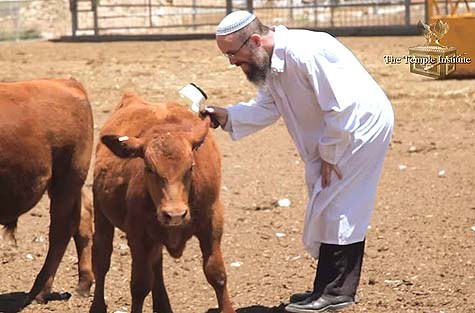
After the red heifer was thoroughly checked to meet all of the above specifications, this perfect, young, female cow was then to be brought to the priest:
You shall give it to Eleazar the priest, and it shall be brought outside the camp and be slaughtered in his presence. Next Eleazar the priest shall take some of its blood with his finger and sprinkle some of its blood toward the front of the tent of meeting seven times. Then the heifer shall be burned in his sight; its hide and its flesh and its blood, with its refuse, shall be burned. The priest shall take cedar wood and hyssop and scarlet material and cast it into the midst of the burning heifer. – Num. 19:3-6
The priest was to slaughter the red heifer, take some of its blood and sprinkle it towards the front of the tent of meeting seven times, and then burn the red heifer together with cedar, hyssop, and scarlet material. What was the purpose of this perfect sacrifice with these added materials?
The Ashes of the Red Heifer
When all was said and done, the perfect red heifer was reduced to ashes, however, the LORD had a particular function for these ashes within the community of Israel:
Now a man who is clean shall gather up the ashes of the heifer and deposit them outside the camp in a clean place, and the congregation of the sons of Israel shall keep it as water to remove impurity; it is purification from sin. The one who gathers the ashes of the heifer shall wash his clothes and be unclean until evening; and it shall be a perpetual statute to the sons of Israel and to the alien who sojourns among them. – Num. 19:9
The ashes of the red heifer were to be used by the Israelites, and anyone who sojourned among them, as a means of cleansing and purification from sin.
The Waters of Purification
The ashes of the red heifer together with water were a means of spiritual purification before God. This was not a magic potion to bring purification from all sin, but rather a means of purification when anyone became defiled through coming in contact with a dead person:
The one who touches the corpse of any person shall be unclean for seven days. That one shall purify himself from uncleanness with the water on the third day and on the seventh day, and then he will be clean; but if he does not purify himself on the third day and on the seventh day, he will not be clean. Anyone who touches a corpse, the body of a man who has died, and does not purify himself, defiles the tabernacle of the LORD; and that person shall be cut off from Israel. Because the water for impurity was not sprinkled on him, he shall be unclean; his uncleanness is still on him. – Num. 19:11-13
Death is considered an unclean state and whenever a person came in contact with death, they needed to be purified. The ashes of the red heifer together with water were a means to make one ritually clean before God.
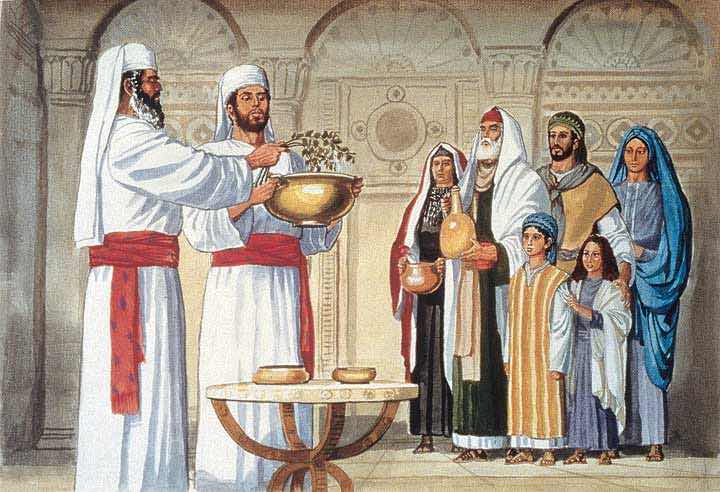
God’s Prescription for Cleansing
There are various scenarios that are detailed throughout the rest of this chapter in Numbers 19 to explain when a person is considered to be unclean by coming in contact with a dead person and how they were to be cleansed through the water and ash mixture (Num. 19:14-22). Outside of stating that the unclean person defiled the Tabernacle of the LORD by their unclean state, no other explanation is given for this prescription of cleansing through the ashes of an unblemished red heifer together with cedar wood, hyssop, and scarlet material. Why did God prescribe this exact formula for cleansing the Israelites from the impurity of death?
A Result of Disobedience
One of the most obvious answers regarding the timing of the giving of this ordinance for cleansing from the impurity of death is that it follows soon after the return of the twelve spies and the rejection of the majority of the people to go up and conquer the Land. As a result, the LORD judged the people and determined that the whole generation that was twenty years old and older, except Joshua and Caleb, would die in the wilderness:
But as for you, your corpses will fall in this wilderness. Your sons shall be shepherds for forty years in the wilderness, and they will suffer for your unfaithfulness, until your corpses lie in the wilderness. According to the number of days which you spied out the land, forty days, for every day you shall bear your guilt a year, even forty years, and you will know My opposition. I, the LORD, have spoken, surely this I will do to all this evil congregation who are gathered together against Me. In this wilderness they shall be destroyed, and there they will die. – Num. 14:32-35
For forty years the children of Israel would bury that whole generation of people who rebelled against the command of the LORD. Death continually face them during this time and the LORD provided a means for them to purify themselves if and when they came in contact with a dead body.
This judgement on the generation of Israel clearly provides a reason for why God had to provide a law instructing the people to be careful to cleanse themselves from the impurity of death, but it doesn’t answer the question of the red heifer and the added materials that were together turned into ashes. What was the purpose of this exact combination of materials for the waters of impurity?
Why did God prescribe this exact formula for cleansing?
Throughout the Bible, especially in the Torah, we see many examples of God prescribing exact formulas to be followed in order to establish holiness and to provide a means for His people to worship Him in the manner which He so desires. Here are a few examples:
- The construction of the Tabernacle and all of its furnishings – Ex. 25:8-9
- The formula for anointing oil – Ex. 30:22-33
- The formula for incense – Ex. 30:34-38
- The instructions for various sacrifices and offerings – Lev. 1-6
In each of the above examples from Scripture, God gave specific instructions to be carried out according to His commands.
God does not always tell us why He commands us to do certain things in a certain manner. He is the King of the universe and part of the walk of faith with God acknowledges that He makes the rules. This is exactly what we see in the instructions regarding the red heifer and the other materials that are burned to ash and mixed together with water to purify individuals. In order to remain in the camp of the Israelites with the presence of God dwelling in their midst, a person, whether an Israelite or a foreigner, had to be considered clean in God’s sight.
According to God’s Word, it was only the ashes of the red heifer together with water used in the prescribed way that were able to purify a person from the uncleanness of death (Num. 19:9-10). The irony of this ritual of cleansing is that it was through the death of a perfect red heifer that the Israelites were purified from the uncleanness associated with death. Through the death of the read heifer they were made clean and could continue to live in the presence of God.
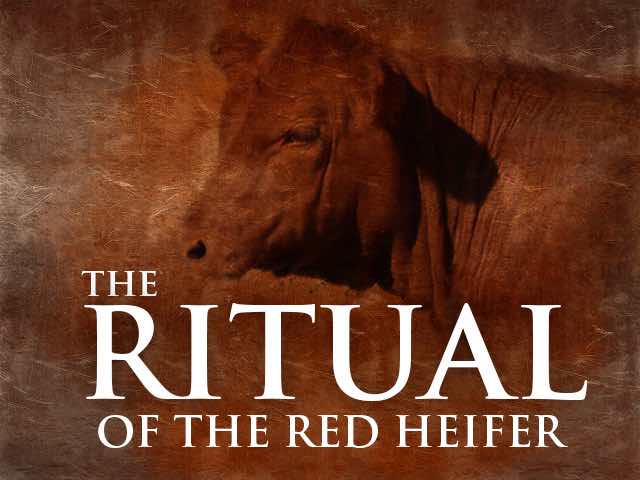
The Reason for the Red Heifer
There is no explanation in the Bible regarding why God specified this exact formula for the burning of a perfect red heifer together with cedar wood, hyssop, and scarlet material in order to provide a means of cleansing. The former Chief Rabbi of the State of Israel answered his own questions regarding God’s instructions for the red heifer in the following manner:
“Why specifically a cow? Why specifically red? Why must it be one which had never worn a yoke? Why do the ashes purify man? We don’t have definitive answers to these questions. They are all in the hands of God.” – Lau, Rabbi Israel Meir. Practical Judaism. Modan Pub. Tel Aviv. p. 284
As Rabbi Lau has so eloquently stated, there are some things in life that must simply be left in the hands of God. God Himself sets the standard for holiness and He determines how we are made clean and holy in His sight.
God’s Cleansing Power
Despite all of the details found in the Torah which instruct the Israelites regarding how to be clean and holy before Almighty God, the LORD tells us through the prophet Ezekiel that God Himself will provide another cleansing water which will cleanse His people from the filth of all their sin:
Then I will sprinkle clean water on you, and you will be clean; I will cleanse you from all your filthiness and from all your idols. Moreover, I will give you a new heart and put a new spirit within you; and I will remove the heart of stone from your flesh and give you a heart of flesh. I will put My Spirit within you and cause you to walk in My statutes, and you will be careful to observe My ordinances. – Ezekiel 36:25-27
This magnificent prophecy speaks of the cleansing from the filthiness of sin together with the promise of the giving of God’s Spirit to His people in order to lead them in His holy ways. In these verses we read about complete cleansing combined with faithful guidance through the indwelling of God’s Spirit.
This prophecy in Ezekiel 36 relates specifically to the nation of Israel and God’s promise to restore the land and the people of Israel for His Name’s sake. This prophecy is not dependent on the careful observance of God’s instructions but rather on God Himself:
Therefore say to the house of Israel, ‘Thus says the LORD GOD, “It is not for your sake, O house of Israel, that I am about to act, but for My holy name, which you have profaned among the nations where you went. I will vindicate the holiness of My great name which has been profaned among the nations, which you have profaned in their midst. Then the nations will know that I am the LORD,” declares the LORD GOD, “when I prove Myself holy among you in their sight…” – Ezekiel 36:22-24
It is the LORD GOD who acts on behalf of His people to bring about their great salvation and deliverance. God promised to deliver His people from the nations where they have been scattered, to bring them back to the Land of Israel, to provide cleansing from their sinful ways, and to fill His people with His Spirit.
The Prescription for the New Covenant
The promises of God in Ezekiel 36 are in keeping with God’s promise to establish a New Covenant with His people and to provide complete forgiveness from sin (Jer. 31:31-34). This forgiveness of sin would not occur in a vacuum but rather in accordance with God’s prescribed plan to bring redemption through His Messiah, the Anointed One (Isaiah 53:4-6). God also declared that the Messiah would not only redeem His people Israel but He would also be a light to the Gentiles (Isaiah 49:5-6).
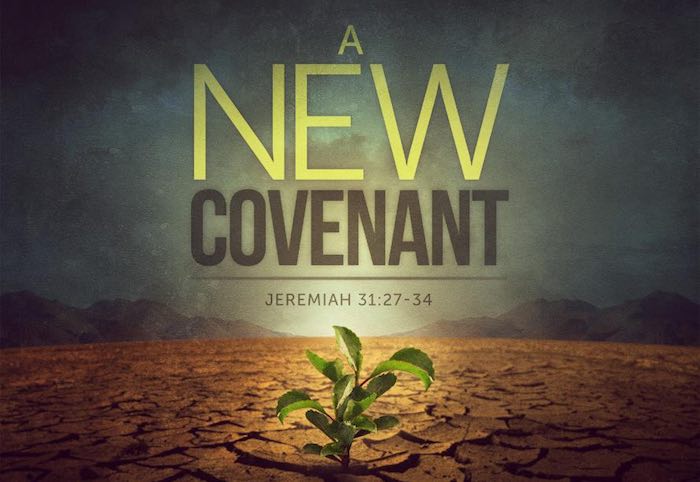
God’s Specifications for the Messiah
Just as the red heifer had to fit the specifications that the LORD prescribed, so would the Messiah (the Anointed One), have to meet certain criteria in order to fulfill this promise of God to purge His people from sin:
- He would be born in Bethlehem – Micah 5:2
- He would be born of a virgin (literally “a young woman”) – Isaiah 7:14
- He would be called Emanuel (“God with us”) – Isaiah 7:14
- He would be a child that would be born and son that was given – Isaiah 9:6
- He would bear many names: Wonderful Counselor, Mighty God, Eternal Father, and Prince of Peace – Isaiah 9:6
- He would reign eternally on the throne of David – Isaiah 9:7
- He would reign as King on Mt. Zion – Ps. 2:6. Zech. 14:9,16
This is a brief list of the many prophecies regarding the Messiah who would come to bear the weight of the sin of the world and provide salvation from the judgment of sin for Jew and Gentile alike.
The Red Heifer & The Messiah
Although the ashes of the red heifer provided a means of cleansing, this cleansing was only temporary and would have to be applied each time a person was defiled. Unlike the temporary cleansing by means of the ashes of the red heifer, the cleansing from sin that the LORD would provide through His Messiah would be perpetual and eternal in accordance with the very nature of the Messiah Himself:
For if the blood of goats and bulls and the ashes of a heifer sprinkling those who have been defiled sanctify for the cleansing of the flesh, how much more will the blood of Messiah, who through the eternal Spirit offered Himself without blemish to God, cleanse your conscience from dead works to serve the living God? For this reason He is the mediator of a new covenant, so that, since a death has taken place for the redemption of the transgressions that were committed under the first covenant, those who have been called may receive the promise of the eternal inheritance. – Hebrews 9:13-15
The unique characteristic of the eternal nature of the Messiah provides an eternal source of cleansing that continually purifies those whose hope is in Him.
Through the death of the Messiah we who have been tainted by the sin of this world can be made clean through the applying of His cleansing blood to our lives. This is the wisdom of God:
Where is the wise man? Where is the scribe? Where is the debater of this age? Has not God made foolish the wisdom of the world? For since in the wisdom of God the world through its wisdom did not come to know God, God was well-pleased through the foolishness of the message preached to save those who believe. For indeed Jews ask for signs and Greeks search for wisdom; but we preach Messiah crucified, to Jews a stumbling block and to Gentiles foolishness, but to those who are the called, both Jews and Greeks, Messiah the power of God and the wisdom of God. Because the foolishness of God is wiser than men, and the weakness of God is stronger than men. 1 Corinthians 1:20-25
God’s wisdom and His provision of cleansing from sin is foolishness to the world system in which live. God has invited us to believe in His Messiah, the embodiment of His power and His wisdom, who through His death offers us cleansing from sin and life eternal.
Shabbat Shalom – We welcome your comments below!
If you enjoyed reading this article, share it today with friends! We also invite you to sign up for our weekly Torah Portion commentary on the sidebar to the right.
Help keep our weekly commentaries free and available to all. Click here to donate today:
Torah Portion: Ex. 30:11 – Ex. 34:35
Haftara: 1 Kings 1:18-39
Maftir for Shabbat Parah: Num. 19:1-22
Haftara for Shabbat Parah: Ezek. 36:16-38
Return to Torah Portion Homepage
Copyright Jewels of Judaism. All rights reserved 2017

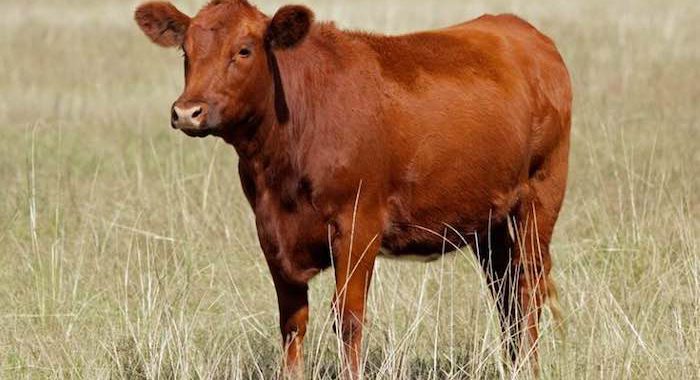

Reading the Torah is fine but Christians are not beholden to the Old Covenant. We have a New Covenant with God.
Num 19:21 red
The heifer, the principal component of the water for impurity (v. 9), signifies the redeeming Christ. The color red signifies the likeness of the flesh of sin, which is for the bearing of man’s sin outwardly. The heifer being without defect signifies that although Christ was in the likeness of the flesh of sin, He did not have the sinful nature (Rom. 8:3 and note 3). That the heifer was without blemish indicates that Christ was perfect (see note 61, par. 1, in Exo. 12). The heifer having never been under a yoke signifies that Christ was never used by anyone, especially by or for God’s enemy, Satan (cf. Exo. 12:5 and note 1).
Thank you so much Daniel. I am really enjoying these explanations. I know so little, and as ‘old age’ creeps up on me, my memory doesn’t serve me very well either. I live in hope that this will improve, and as Geoff and I read the Torah portions and take in your explanations, I do hope we will be more educated as time goes on. Take care and enjoy your time in the Holy Land. Much love in Jesus, Rose and Geoff
I love teaching about the Red Heifer!!! Do you think there is a significance in John 2:6 with Jesus turning water into wine with the ashes of the Red Heifer? He used the six stone jars that the Jews used for ceremonial cleansing. Could these jars be the ones that were used for the storage of the ashes of the Red Heifer? If so, that would lead to more significance concerning His first miracle….blood (wine) of the New Covenant providing purification from exposure to “death”. Waiting for the perfect Red Heifer to be found! Thanks for such interesting articles. I’ll be in Israel May 1-12 with a tour group of 48 and then Jody and I all be bringing a volunteer group Oct18-Nov20. Hope to see you this year for another Shabbat!
Blessings and joy in Yeshua!
Hi Carole,
Thanks for your comments and thoughts about the waters of purification and the possible reference to the ashes of the red heifer in John 2:6. I don’t think there is any connection between the waters of purification mentioned in Num. 19 and the stone water pots for purification in John 2. Since the ashes of the red heifer were mixed with water before being sprinkled on a person for cleansing from the dead (Num. 19:14-19), it seems more apparent that the ashes would be kept dry until they were needed.
In John 2 there were 6 large pots of water (containing 20-30 gallons each – 80-120 liters each). That was a lot of water and the most natural reason for this water would be for the ceremonial washing before eating, especially before touching bread. This would make more sense as there was a huge wedding party and everyone would need to wash there hands before eating.
I hope this helps shed some light on this subject.
Blessings,
Daniel
Thank you. I love learning how the Old and New Testament link together seamlessly. It is one story and the author draws the threads which once revealed allow much better understanding.